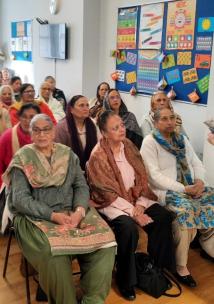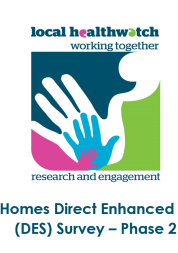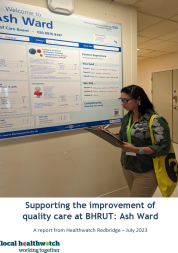Women's Health Project

Healthwatch Redbridge was commissioned by Healthwatch England to interview women with disabilities (either women with learning disabilities or women with physical disabilities or any extra mobility needs) and women from the Somali community. We conducted interviews and ran two forums in partnership with One Place East and Women’s Inclusive Team.
Healthwatch Redbridge findings for this project include:
- Somali women feel that their experience of “cutting” should not restrict them to access Cervical Cancer screening. They feel they are either pitied or questioned about their past cutting experience. This should not be the focus of their access to screening. Somali women feel the sense of “them” and “us” and these types of barriers need to be removed throughout the NHS, providing staff with education and showcasing a non-judgmental attitude.
- Individuals with learning difficulties felt NHS staff need to adapt their attitude to ensure there is more of a patient centred approach used. Individuals felt that not enough accessible information about cervical screening was provided to them
- Wheelchair users who are unable to weight bear reported that they were unable to attend their practice as there was no access to the examination room or couch, in hand these individuals were marked down on their medical records as non-attendance. The wheelchair users who did attend their local practices were asked if they could stand up and get themselves over onto the couch, completely ignoring that they are wheelchair users. No equipment was present on any of these visits alongside no extra time in the appointment was provided for moving and handling of the patient.
- Wheelchair users also reported that some medical professionals had not prioritised their treatment due the fact that they were disabled. The assumption being that they would not be sexually active.
- Wheelchair users who are from ethnic backgrounds reported cultural barriers, where their families did not approve of them having cervical screening and accused them of having sexual relationships, if they were to access this service. Families and communities did not believe that a wheelchair user could be sexually active, and in addition non-marital relationships were frowned upon.
Many women came forward to speak about their experiences that not just included cervical cancer screening uptake, but other women’s health areas such as mammogram and menopause. This project has highlighted a need for additional work to be taken on, focusing on women’s health as a whole. Healthwatch Redbridge will focus on developing a project in the near future, as well as joint working with key organisations to understand women's needs and concerns.
Please contact us on 020 8553 1236 or via email: info@healthwatchredbridge.co.uk if you would like to share your experiences of cervical screening, mammogram, menopause or any other issues relating to women's health.

